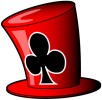Table Selection
The single most significant decision you'll make which will affect how much money you can win (or how much you are likely to lose!) is table selection.
It's incredibly important! You simply must find a table where the majority of the people make more mistakes than you do. If you find that table you will win in the long run and if you don't you will lose. You can be a world class player but if you sit at a table where everyone else is a better world class player you will lose. There is no shame in sitting at a table under your skill level, quite the contrary that's where you need to be sitting!
The best kind of table is one that has a lot of people having fun, and not much raising. You probably won't find this table very often, but this should be your ideal.
When you first sit down don't post the big blind. Instead, wait and watch the table. In just a few rounds you'll begin to get an idea how many of the people play. Notice especially their starting cards and how they bet them. Do they like to bet on the come? Do they overvalue pocket pairs or an ace with a low kicker? Do they seem to understand position?
At first you are looking for a general sense of how things are going at the table. As you sit and play you should be constantly refining this estimate.
What to look for:
-
Opponents who overplay high pairs or who overvalue high unsuited starting cards (AQJ rainbow)
-
In Hi/Lo games, players who will always come in with any three cards 8 or lower (873)
-
Opponents who overvalue any starting pair (split 9s in a loose game)
-
Opponents who bet and raise on the come when they are not drawing to the high straights and flushes.
-
Opponents who like to play every starting hand (7T2 rainbow, etc.)
-
Opponents who play strong multi-way hands (large suited and connected cards)!
Usually you are making money from everyone who is playing worse than you and giving it to everyone who is playing better. That means that you should be sure that you are better than at least half the players at the table (and preferably better than ALL of them)

|
Be careful about sitting down at a wild table, even if everyone there is playing any two cards. The variance at a table like this is going to be huge and if you get a run of bad cards or bad beats it can take a serious chunk out of your bankroll. Loose passive tables are often your best bet for solid low-risk poker income. |
| Warning |
Remember: you don't need to play every hand
If you are feeling frustrated from an especially bad beat, or the table is wild you can simply sit out. This is often a better approach than "tightening up" as the second or third bad beat in a row with "good cards" can easily drive any player into a bad poker-playing frame of mind.
Order some fries and a coke and sit back and watch. When things calm down take your blind and start again.
Do not play poker when you are not able to make good decisions!!
That means don't play when anger and frustration are ruling your thoughts and especially don't play when you are bored or tired. Some players bring CD players and listen to music during the game. Do whatever it takes to keep yourself awake and alert and ruled by logic and not emotion.

